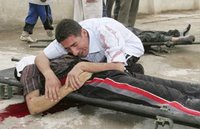
The intervention in Iraq that was intended to make the world safer for democracy has only made it more dangerous
Timothy Garton Ash
Thursday October 26, 2006
The Guardian
"'They died in vain." Four words that are unbearable for the mother of a dead soldier and shaming for the politicians who sent them to their deaths. So our leaders say "they did not die in vain". But who now believes them?
Contemplating the scale of the American-British failure in Iraq, I have been struggling to see if there are any future circumstances, any lines of long-term strategic action, which would one day enable us honestly and credibly to say to the mother of a soldier who died in Iraq: "Your son did not die in vain." At the moment, that seems nearly impossible.
Oh yes, and there's the cost. The Nobel prize-winning economist Joseph Stiglitz has estimated that the total, eventual costs of the Iraq war, "including the budgetary, social and macroeconomic costs, are likely to exceed $2 trillion" - that's $2,000,000,000,000. That would be $2,000 a head for each of the world's poorest billion people, who live (and die) on less than $1 a day.
It's not too soon to suggest that the American-British invasion and occupation of Iraq has proved to be the greatest strategic blunder of our time. So what can we honestly say to that grieving mother or father? "Your son (or daughter) died in vain"? Brooding on this, my thoughts have strayed to the Hungarian revolution of 1956, the 50th anniversary of which we mark this week. Both stories started with joyous crowds celebrating round the toppled statue of a tyrant (Stalin in Budapest, Saddam in Baghdad). In both places, celebration had turned within weeks to bloodshed and misery.
Of course the cases of Hungary and Iraq are quite different in all sorts of ways. Unlike British and American soldiers in Iraq, the Hungarians were fighting directly for the freedom of their own country. But the point of the comparison is simply that our judgment of such dramatic events will change over decades, depending on their long-term consequences - but also on our own policies. Given a fortunate turn of history, and if democracies can learn from their mistakes, committing themselves more intelligently to a long-term struggle, even a defeat can be a milestone on the path to victory."
***
I disagree with the basic premise of this comment. The Iraq invasion was never intended to "make the world safe for democracy." The writer tries to discredit the Lancet estimate of 655,000 Iraqis killed. There was no wide-spread rejoicing by the Iraqis initially as he claims. The toppling of Saddam's statue was a staged affair by the US army.
The comparison to Hungary in 1956 is ridiculous. And look at this: "if democracies can learn from their mistakes, committing themselves more intelligently to a long-term struggle, even a defeat can be a milestone on the path to victory." So, the whole thing was just an honest mistake from which the benevolent Anglo-American hegemon will hopefully learn and ultimately achieve "victory!"
This comment is an example of the mendacious nature of some of the apologists for this horrendous rape of a nation; in the Guardian none the less.

No comments:
Post a Comment